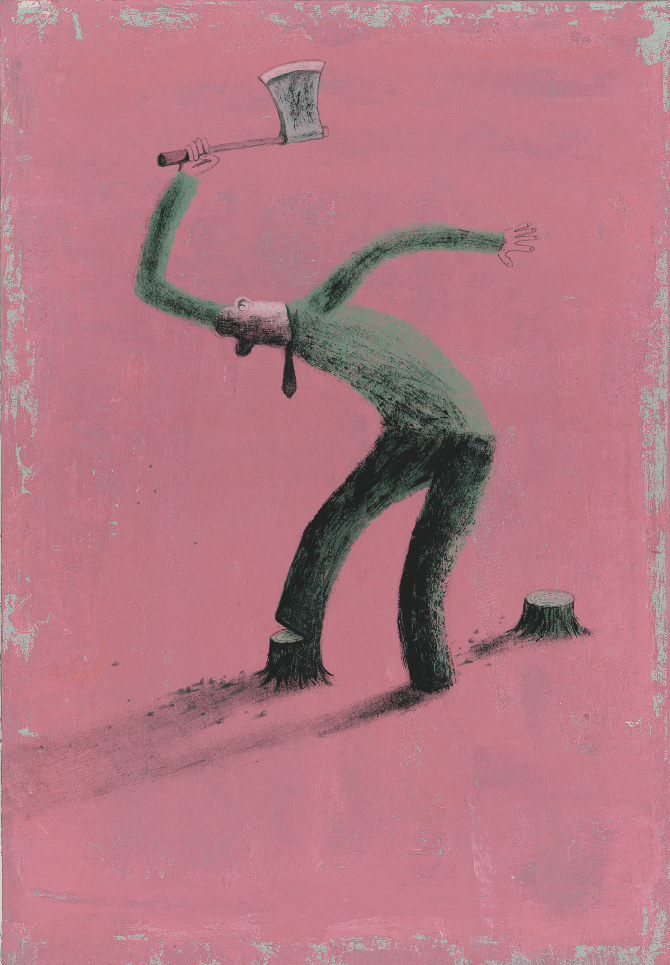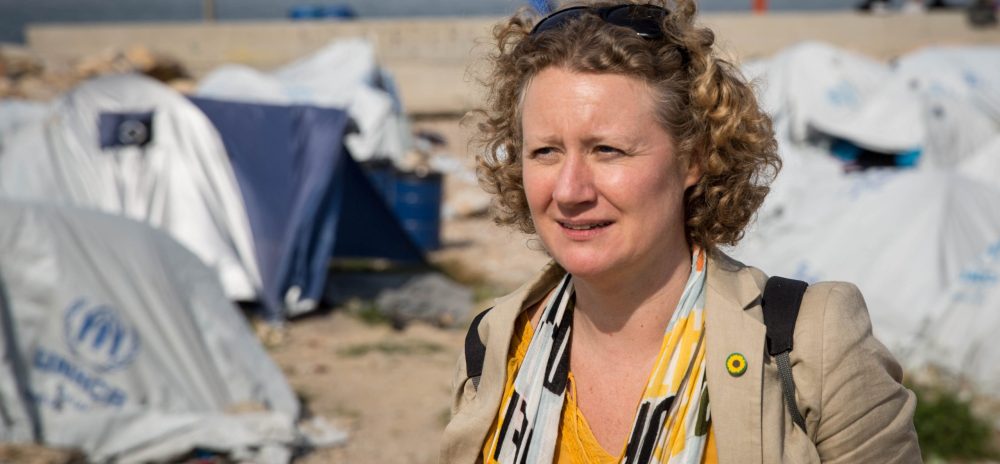European Green Journal, volume 13, summer 2016. Interview with Judith Sargentini and Michael Berg
In a pattern mirroring the economic crisis, instead of supporting a collaborative European solution, many of the Member States’ governments opt for more expensive, complicated and nationalist responses to the threats they face. A discussion with Dutch MEP Judith Sargentini, and Michal Berg, Deputy Chairman of the Czech Green Party.

Can we turn Europe’s common fear of terrorism into a force that brings about further integration? Can “no more fear” have the same effect as the promise of “no more war” did after World War II – when Europe’s nations transformed their deep mistrust of one another into a project of integration?
Judith Sargentini: Rationally, the current security threats should lead to more integration, not less. Many of the “home-grown” fighters who committed terrorist attacks in Europe were known to the security agencies. The person who carried out the attack on the Jewish Museum in Brussels in 2014 used to fight in Syria. The French security agencies knew that and the Germans did too. But nobody told the Belgians. The men behind the bombings in London were known to the authorities; the murderer of the filmmaker Theo van Gogh was tapped by the national security agency in the Netherlands, and still he was able commit his crime. So, from a rational point of view, I would say that national security is a concept that should be changed to European security, because as long as you call it national security, and as long as you keep all your rights and duties at the national level, you will not be able to organise inter-European cooperation.
The situation is very similar to the economic crisis, which was also supposed to lead to more Europe, and should have led us to the understanding that governance is not about state sovereignty anymore, but about the sovereignty of banks – as they are the ones in power today. But emotionally we see a completely different understanding of the issue: instead of trying to find a common European solution, we are mixing up terrorism with the refugee issue, and everyone is focused only on protecting their own country and their own borders from the perceived threat from outside, as well as from other Member States. And the real question is how to overcome that emotion and bring our politicians back to a rational view of dealing with the real threats.
Michal Berg: From a Central European perspective it is slightly different. We have been really lucky so far that we haven’t had a terrorist attack on the scale of those in Brussels or Paris. So the mental connection between terrorism and European integration is not so strong in Central Europe. People don’t perceive it as a real threat. But still they have this feeling that in the Schengen area terrorists can easily move to the Eastern Member States if they want to. So they associate Western Europe with the threat, and that makes them hostile towards the EU, even though there is no rational basis to that: why would terrorists want to move to the Eastern Member States and attack Europe from there? They already know that in the East the support for the European project is waning, and there is no need to attack Eastern Europe, because Eastern Europeans are quite capable of weakening their connection to Europe themselves, even without the external influence of terrorists.
Michal says that Central Europe is not under threat because terrorists see that those countries are already hostile towards Europe. Do you think it is a goal of terrorists to stop Europeanintegration?
JS: No, but every time we overreact to a terrorist attack, or every time we make a connection between Muslim refugees and terrorists, we are helping Daesh [1] in their fight against the openness of Western societies. We are putting restrictions on our liberal democratic states, and with that we are making people’s lives, especially European Muslims’, more difficult. It must be a joy for those behind the terrorist attacks to see these populist debates going on in Europe. In the Netherlands, the Parliament recently debated a ban on Salafist organisations, because terrorists are often Salafist-influenced. But that’s a flawed way of thinking: just because many terrorists took their inspiration from the Salafist tradition doesn’t mean that Salafism per se is violent. So if we are debating whether Salafism should be forbidden, we are also pushing away those Salafists who just have a very orthodox religion, but are not involved in criminal acts. Of course, I am not appreciative of Salafism: I don’t think it emancipates women, it doesn’t give people fair chances in life, and it doesn’t fit into the kind of inclusive society we want to share with each other, but they are not dangerous. But when we marginalise them we play into the hands of Daesh.
MB: And not only Daesh. If we restrict freedoms we will in a sense become indirect allies of Putin and his regime who see liberties as a threat to their survival. They believe that politically it is problematic to let people freely do, think and say what they want to. There is a rising support for Putinist parties in Hungary, the Czech Republic and Slovakia; many Central European governments look at Russia as an inspiration in their policies, and cooperate with a regime that is trying to undermine the democratic, national security, military and economic endeavours of Europe. We have already witnessed some Czech generals and other high-ranking officials getting involved with Russian intelligence services, which is really worrying. And I think intelligence service cooperation could be really helpful against both the Russian and the Islamist threats in Europe. This is way more effective than spending money on the demonstration of power, and on sending the military onto the streets, which makes some people feel less secure rather than reassuring them that the governments of Europe have the situation under control.
They are the kind of people who buy “Islam for Dummies” on Amazon. So I don’t think their radicalisation has to be explained by pointing to cultural or religious reasons alone. – J. Sargentini
Many Europeans (especially in the Eastern Member States) are afraid of the unknown – such as newcomers to our societies – and this plays into the hands of populists like Orbán, who claim to provide answers to their misgivings. How can we win support from them for integration?
JS: If you look at terrorism over the decades, we see a lot of home-grown terrorism, where not even the parents or grandparents of the terrorists were immigrants: terrorist groups like the IRA, RAF, ETA [2], and so on. We had a lot of terrorism motivated by right-wing or left-wing politics. Now it is religiously motivated; but here again we need to be aware that the young men from Molenbeek, in Brussels, who did the last attacks were still drinking, smoking, doing drugs a few weeks before and they religiously radicalised overnight. They are the kind of people who buy “Islam for Dummies” on Amazon. So I don’t think their radicalisation has to be explained by pointing to cultural or religious reasons alone.
I know this won’t make the problem easier to understand for someone living in a small village in Eastern Europe, but we need to be aware that this issue is rather complicated. You have to explain it to people by looking, among others, at class issues, the discrimination of people, their chances in life, and so on. I don’t want to leave Islam out of the debate, but it is just not the sole issue. Secondly, refugees are forced to come to Europe via irregular routes, because there is no other way for them to flee those unbearable conditions back home or in the refugee camps, and if there are irregular routes it becomes inevitable that jihadists and criminals can use them as well. But this wouldn’t be the case if we had a way to allow people in need to enter Europe in an organised way, in which we could have conducted security checks, and so on.
The former President of Germany, Christian Wolf, famously said that Islam was part of Germany. And in the same way, we can argue that it is part of Europe as well. But if it is part of Europe, can’t it be criticised and scrutinised the same way as Christianity?
JS: In my country we are much more critical of Islam than of Christianity. In the Netherlands we have a “Bible belt” where in certain villages you can’t withdraw money from a cash machine on Sundays, where families still have nine to ten children, where women and girls are not allowed to wear pants, and the orthodox Christian party does not allow women on their party lists – and that is unjustly seen as folklore. But Islam is judged more harshly.
MB: On the example of the Vietnamese community in the Czech Republic we can see that integration per se can work even in Central Europe: Vietnamese people run successful businesses, their children go to universities, and they live side-by-side with the Czechs without a problem. Therefore, even in the case of Islam, religion and cultural values are only secondary questions. The major question is where the money comes from, whether these societies will have to pay for integration themselves, and how it is going to affect their welfare systems. Some, especially older people and people from the countryside in Central and Eastern European countries, already feel like losers of the transition processes of the 90s, and they are afraid that the newcomers will take away from them the rest of what they possess. To some extent it is similar to the issue of Central Europe’s Roma populations, where the local politicians always complain that they don’t have enough money to integrate the Roma, or to build decent houses for them. And they see the refugees as an additional burden that adds to this situation.
JS: But even in the case of populist politicians like Hungary’s Viktor Orbán, the issue of anti-refugee propaganda is not about whether or not the refugees can be integrated or whether they are perceived as a threat by the government, but about the fact that the country cannot deliver on its promises for economic growth, so Orbán just wants to distract the attention of the voters. And the same stands for Marine Le Pen in France or Geert Wilders in the Netherlands.
In the West, people are afraid that this way of living might not last forever, while in the East, they think that they will never be able to reach this standard of living. – M. Berg
How did we get to this situation in which national interests and the short-term populist goals of some Member States seem to trump the interests of the EU?
JS: I think it was always so, to some extent. A good example is the fact that we introduced the Euro, but did not integrate into a political union. We did start to integrate on environmental laws, and partly on labour laws, but not on foreign policy. We also did not want banks to be controlled at the European level. I think the Central European Member States have the feeling that they just got back their independence in the 90s, and now they are reluctant to sacrifice part of it again to a supranational entity. With the last economic crisis it became even worse, with major job losses and current efforts from governments to cut their social spending as a reaction to economic hardships.
MB: Slovakia and the Czech Republic have not been influenced by the crisis, so economically we have no reason to complain about the European Union. I think here the main driver was our former president, Vaclav Klaus, who was both anti-European and anti-environment. His opinions had a great influence on Czech public opinion: today we are the EU country with the greatest percentage of people denying climate change for example. And now with the refugee crisis many political parties and politicians saw, based on Klaus’ popular anti-Europeanism, an opportunity to make some political gains based on the refugee issue.
Judith said at the beginning that in many cases there is a quite obvious rational choice for many of our problems. Nevertheless, the leaders of our countries go with an emotionaland rather irrational choice. Why? Where do these feelings come from?
MB: I think lots of people just feel that the world is changing too fast, and they don’t really understand what is going on, and what is influencing their lives. So they are constantly looking for new, convincing explanations: sometimes it’s the economy, sometimes the EU, and sometimes the refugees. In the West, people are afraid that this way of living might not last forever, while in the East, they think that they will never be able to reach this standard of living. And we just need to look at the disenfranchised youth of Spain or other Southern Member States: they are already in this situation.
JS: That’s true. In Spain and Greece, the youth unemployment is huge, but the response to the problem did not lead to increased populism – instead, they brought to life Syriza and Podemos. I think in most of Europe, we are trying to cover up our economic issues with this irrationalism, and I partly blame politicians for this. We are not looking for the right solution even if that fits our political goal. For example, in this case, the Dutch government is not supporting a European solution – fair share – on the refugee issue, even though it knows that that would mean less refugees for the Netherlands. If the Europeans shared the burden, it would be much easier and cheaper to deal with this issue. But we are not willing to.
This seems to imply that Europeans don’t trust each other.
JS: If that’s the answer then the EU is doomed. And with that issue of mistrust we are back where we were with the first question: I’d say having a different approach on the issue of security could help us with European integration, but for that we need a different definition of security. There is no such thing as national security anymore, or at least there shouldn’t be. Whether you close your borders or not, criminals and terrorists will move over borders. You need to act together, you need a European answer to fight them.
[1] Daesh is the Arabic language acronym for the Islamic State of Iraq and Syria (ISIS)
[2] Irish Republican Army, Rote Armee Fraktion (Red Army Faction or Baader-Meinhof Group), and Euskadi Ta Askatasuna (Basque Country and Freedom)

